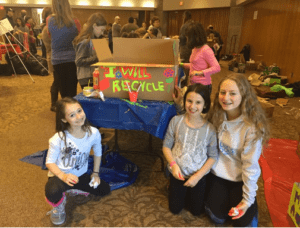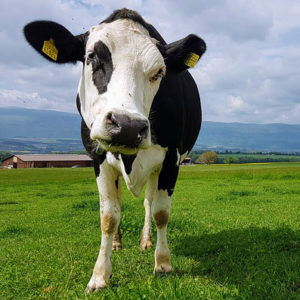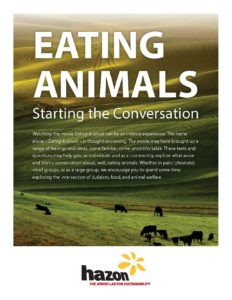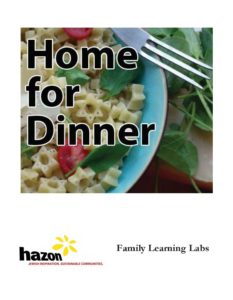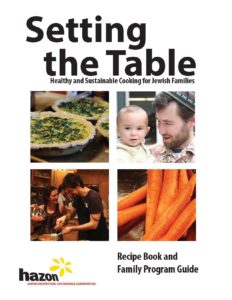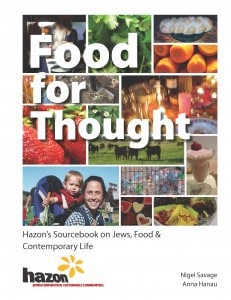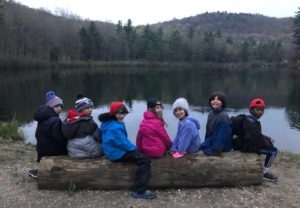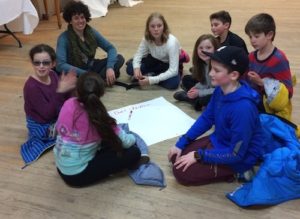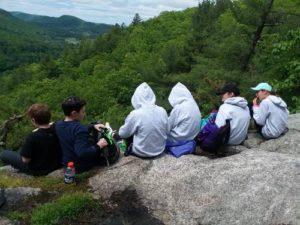Hazon Educational Library: Adult learning
Recycling Toolkit
Hazon
Recycling is the process of redirecting materials that would otherwise become waste and turning them into new products. It allows you to see the tangible impact your actions have on the environment. You should feel proud of the amount of material you’ve diverted from the landfill!
Reduce, reuse, recycle! In this saying, order is critical. Try to reduce and reuse your waste before recycling. While recycling is sometimes the best option available, it should be the last resort. Despite the challenges of recycling as a waste diversion method, it is an important sustainability tool when done properly.
Hazon’s Seal of Sustainability’s Recycling toolkit uses Jewish framing to show you step-by-step how to recycle and how to set up a recycling program in your community.
Category: Environmental Justice, Sustainability
Tags: Adult learning, community
Industrial Animal Agriculture and Climate Change – A Story Source Sheet
Hazon
The connection between industrial animal agriculture and climate change is significant. But why and how is that so? This two-page source sheet presents a string of data that tells a concise and compelling story of the connection between industrial animal agriculture and climate change. Based on the writings of Jonathan Safran Foer in his book We Are the Weather: Saving the Planet Begins at Breakfast.
Eating Animals
Hazon
Based on the bestselling book by Jonathan Safran Foer, the film Eating Animals is an urgent, eye-opening look at the environmental, economic, and public health consequences of factory farming. Hazon created this discussion guide to be used by Jewish communities after screenings to explore the intersection of Judaism, food, and animal welfare, and start a conversation about, well, eating animals.
Home for Dinner
by Vicky Kelman and Judith Belasco
Hazon
Home for Dinner: Hazon's Family Meals Initiative is a synagogue-based pilot program for late elementary to early middle school students and their parents.
Category: Food, Hazon Publications
Setting the Table
by Liz Traison and Daniel Infeld
Hazon
Starting a family commences a period of change. Expectant parents very quickly transition from thinking for themselves to providing for a new life, and the preparation and anticipation can be overwhelming. Especially when thinking about how we want to feed our new families. Setting the Table is designed to help couples think through these challenges with a Jewish lens.
Age(s): Parents
Food for Thought
by Nigel Savage and Anna Hanau
Hazon
Food for Thought is is a 130-page sourcebook that draws on a range of texts from within and beyond Jewish traditions to explore a range of topics relating to Jews and food. Food for Thought is designed to encourage participants to think critically about the food that they eat and the ways their food choices affect the health of their community and the planet.
Category: Food, Hazon Publications
Throwing Stones or Throwing Flowers: Exploring Our Relationship with the Public Domain
by Shani Mink
Pearlstone Center
This program presents students with the opportunity to delve deeply into the hidden messages of verse 50b of the Bava Kama (the stones text). Through text study, discussion and a hands-on activity, students will explore their relationship with the public domain. After investigating the myriad ways in which we might violate the public domain, students will actively nurture the public domain through shared intentions for community prosperity hidden inside a seed ball or planted beneath a tree.
Bringing The Stones’ into the 21st Century
by Nicole Cruz
Peninsula JCC
'The Stones' text, from Talmud Bavli, Masekhet Bava Kama 50b, brings its readers back to ancient times. However, the lessons that can be learned from this text transcend time. In this program, participants will delve deep into 'The Stones' text, making connections relevant to today's world. Through this discussion, participants will discover what defines a community, and how in order to make an impact in a community, we must find a balance between protecting the Earth and meeting our own personal needs.
Age(s): Adults
Stone Wall
by Eli Goldstein
Bridgewater JCC
This program is a physically active introduction to The Stones text from the Talmud Bavli, Masekbet Bava Kama, which raises many questions about land, responsibility, and ownership using text and soccer cones.
Age(s): Adults

